What is Self Appraisal?
To evaluate performance, identify strengths, and recognise flaws, it is essential to conduct a self appraisal. It accounts for roles and responsibilities taken vis-a-vis the goals achieved.
When writing a self appraisal, focus on the following:
- Honest recognition of skills and flaws
- Outcomes and results delivered
- Proactive approach
- List additional areas for improvement
- Use data-driven approach
Self appraisals are a core component of performance reviews. However, they can be difficult to structure and analyse to get the best results. In this guide, we’ll cover self appraisal examples and how you can use them for the best results.
A strong self appraisal process gives managers and team leaders additional insight into any issues affecting performance they may have overlooked. When employees conduct a self appraisal, it allows them to reflect on past performance and work towards improving their skills through future development and training.
This guide explores the benefits of self assessments, how they are structured, and the information you need to include to make the most of the process.
Why is It Necessary to Do Self Assessments?
Self assessments are an important strategy to help employees approach their performance reviews, as well as keep on track towards their developmental aims. Performance evaluations are required to keep up to date on strengths and weaknesses so that work related to the individual’s role can be adjusted when necessary, with appropriate training and coaching offered.
An ongoing concern in the business community around performance evaluations is that they are prone to biases that can lead to unfair judgments and decisions. The article in the Harvard Business Review, Why Most Performance Evaluations Are Biased, And How To Fix Them, points out:
“Underlying this process is the belief that by reflecting on people’s performance and codifying it in an evaluation form, we will be able to assess their merits objectively, give out rewards fairly, and offer useful feedback to help them develop in the next year. But while we may strive to be as meritocratic as possible, our assessments are imperfect and all too often biased.”
Self assessments give employees the opportunity to counteract potential biases from management-led performance appraisals. They can also be incorporated into a more holistic approach to appraisals that bring in feedback from the company at large, with performance management tools offering customisable 360-degree appraisals to help automate and schedule the process.
Ultimately, managers will have a much clearer insight into job performance when they can combine their own observations with both the individual conducting the self assessment and the peers and colleagues they collaborate with on a daily basis.
Additional Read: Appraisals for Improving Performance
What Are the Benefits of a Strong Self Evaluation Process?
Performed correctly, self evaluations can bring a wide range of benefits that help employees with their professional development and keep them on track to excel in their performance.
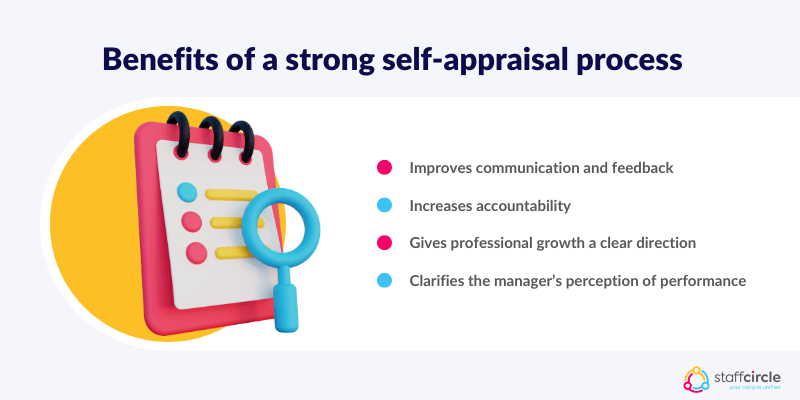
A well-implemented self evaluation process can:
- Improve communication and feedback. Managers can often fall into the trap of conducting a performance review in which they do all the talking. A strong self evaluation gives managers and employees a starting point for more constructive two-way conversations about performance and professional development.
- Increase accountability. When an individual goes through the process of assessing their performance, they are required to provide clarity about the impact of their work and their strengths and weaknesses.
- Give professional growth a clear direction. With their strengths and weaknesses clearly articulated, employees and managers can better direct future training and development in the right areas.
- Clarify any discrepancies in the manager’s perception of performance. Managers often lack insights into issues that may be affecting performance, particularly if these are taking place outside of the workplace. A self assessment gives employees the opportunity to bring up any issues relevant to their performance that managers may have overlooked.
How to Address Weaknesses in Your Self Evaluation Strategy
Acknowledging weaknesses and mistakes is an important element of the self evaluation process, but it is important to approach this in the right way. Everyone has weaknesses of their own to address, whether this is being unorganised and missing deadlines, or excessively micromanaging the work of others rather than focusing on your own tasks.
Over-emphasising failures without including details on how you are working towards overcoming them doesn’t cast your decision-making prowess in the best light. A good rule of thumb to bear in mind whenever you’re in a situation where you need to bring a problem to light is to have a solution prepared. This rule applies equally to a performance evaluation of oneself: whatever your weaknesses are, present a solution about how you intend to address them.
How to Write a Self Evaluation of Performance
While there is no firm rule about how self evaluations of an employee’s own performance should be written, there are several points to bear in mind to make it as effective as possible. We’ve already discussed how to approach addressing weaknesses, so let’s take a look at some other things to consider.
Consider Using the Star Method of Self Assessment
The STAR method is an effective way to structure your self evaluation in a way that clearly lays out how you have overcome any challenges faced.
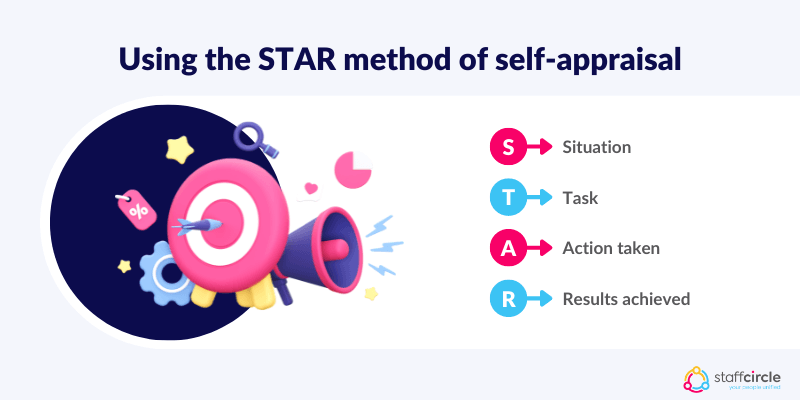
The acronym stands for:
- Situation
- Task
- Action taken
- Results achieved
You can use these four key steps to structure any examples of work that highlight your problem-solving skills, communication successes, and other accomplishments that will help to illustrate great performance.
Place a Strong Emphasis on Your Accomplishments
While care should be taken to avoid coming across as arrogant, placing an emphasis on accomplishments should be front and centre when writing up a self evaluation. Managers may not be entirely clear on how your contributions have led to successes, so take the opportunity to articulate the role you’ve played in successful business outcomes.
If you’ve been given any rewards or recognition over the previous period of time, be sure to include these in your self assessment as well. Performance management software allows users to track all entries linked to awards programs, so you’ll have a record you can refer to in order to back up your accomplishments.
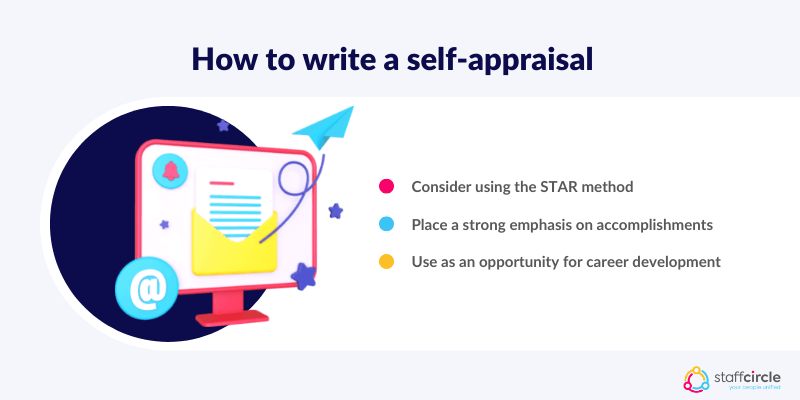
Use It as an Opportunity for Career Development
A strong self assessment should be more than just a reflection on your past performance; it should also be focused on the future, including where you see your career developing. As the article from the Harvard Business Review, How To Write The Dreaded Self Appraisal, observes:
“Smart employees use self-appraisals to lobby for career development opportunities … Explain the aspects of your job that most excite you and suggest ways you can become more involved in those things. You might ask to be included in certain brainstorming meetings or request funding to take a class on data analytics.”
The best way to transform your own self assessment into something useful is to take a proactive approach to how it ties into your professional development.
What Should a Self Assessment Evaluation Include?
There are a number of details you can include in your self assessment evaluation to help strengthen your case and provide appropriate evidence. Try to include the following information in your self assessment:
- A list of accomplishments…. Use concrete examples of your accomplishments to illustrate how you have been progressing in your role. This could be an increase in sales or production of units, increased traffic on the company website, or anything else you’ve achieved in your role.
- … And the metrics and data to support them. Any accomplishments you’ve had that are to be included in your self assessment should be backed by clear data. Quantifying your claims with metrics that can be verified by managers is an effective way to make sure these achievements are recognised for what they are. This can include using any KPI objectives you have met as part of the self assessment evaluation.
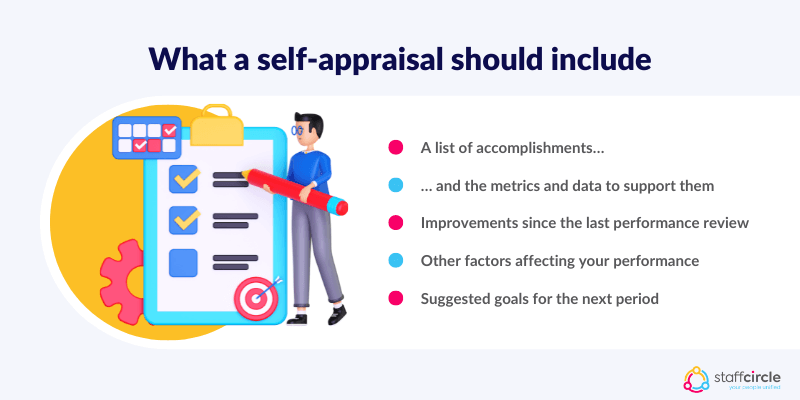
- Any improvements since the last performance review. If the self assessment is linked to an upcoming performance review, take the time to reflect on the goals established at the previous performance review and how you have implemented these improvements.
- Information on other factors affecting your performance. If you’ve had a period of illness, or taken time off to look after a sick family member, make sure you include this in your assessment, especially if it relates to any poor performance.
- Suggested goals for the next period. As we’ve already touched on, if you have identified issues that need to be addressed, tie these to proposed solutions. Link these to goals for the future along with a plan of action for how you intend to break them down and accomplish them in a timely manner. Consider pairing SMART and stretch goals for optimal performance.
Self Appraisal Examples: How to Structure a Self Assessment
The structure of self appraisals can vary depending on the nature of the appraisal, but there are some key questions and fields you need to ask when putting together a template for performance-based self appraisals.
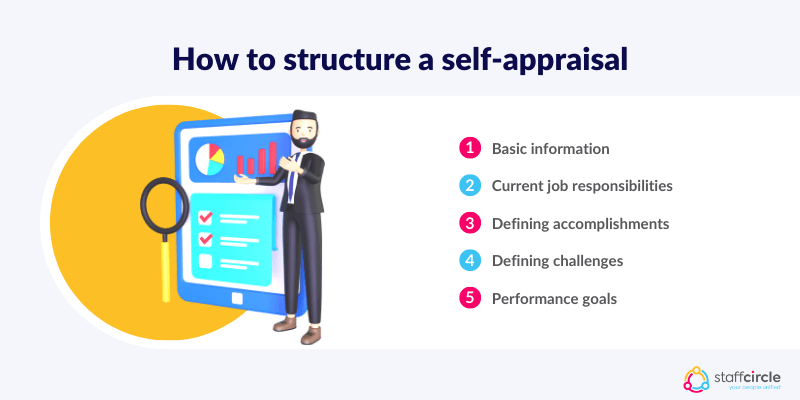
Include the following when putting together a self appraisal template for employees. You can use performance management tools to save these templates for reuse, saving valuable time when the next performance review comes around.
- Basic information. This includes the employee’s name, position, department, review period, and the date the review takes place.
- Current job responsibilities. Here, the employee can list the core responsibilities of their role, and assess their performance in relation to these responsibilities
- Defining accomplishments. In this section, the employee can list the accomplishments relevant to their position, with evidence to support these claims
- Defining challenges. The employee can describe the challenges they faced, and how they overcame them, in this section
- Performance goals. A list of performance and work objectives can be listed here, with a section for self assessment relating to these goals, and any goals they intend to aim for moving forward
Self Evaluation for Performance Review Examples: Best Practices to Follow
When writing self appraisal comments, make sure to include the below things:
- Provide specific examples when you talk about your achievements
- Lay stress on improvements
- Set realistic and relatable work goals
- Maintain a detailed record of the targets completed successfully.
- Use a positive tone for both obstacles and successes.
- When speaking of achievements, talk about areas that may have potential for further improvement.
- Seek feedback
For instance, when writing, use goals that are strategic with a list of achievements supported by adequate data, and ways to further improve upon goals.
Additional Read: 6 Ways to Manage Employee Performance and Appraisal
Company or Personal Core Values
Individual goals are most effective when they are clearly aligned to the company’s core values. With this in mind, it’s worth including an additional section in a self appraisal asking the employee to assess their goals in relation to the overall business strategy.
Before writing a self assessment, revisit the company’s mission statement to see how you can align your proposed career development goals with these values. Whenever possible, include detailed examples of steps you’ve taken to go the extra mile to achieve something that benefits the company.
Summary
While few employees look forward to the process of self appraisals, when performed well they can be a valuable tool for improving performance and developing a career.
This guide should help you to focus on the aspects of your performance that matter the most, helping avoid any biases while orienting the conversation towards a constructive future.





